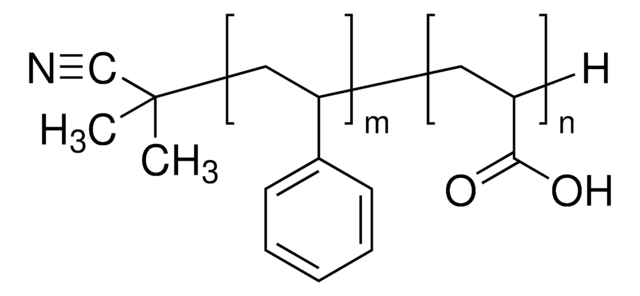746983
Poly(styrene)-block-poly(acrylic acid)
average Mn 38,000, 20 wt. % PAA, PDI ≤1.3
About This Item
Recommended Products
form
powder
mol wt
Mn 27,000-33,000 (polystyrene)
Mn 34,000-42,000 (total)
Mn 7,000-9,000 (poly(acrylic acid))
average Mn 38,000
PDI
≤1.3
Looking for similar products? Visit Product Comparison Guide
Application
Legal Information
Sold for research purposes only. Not for use in humans. Before opening or using this product, please read the following terms and conditions. Use of this product shall constitute acknowledgement and acceptance of these terms and conditions.
Use of this product may be covered by one or more of the following US patents and corresponding claims outside the US: 7,714,075; 7,250,479; 7,666,962; 6,642,318; 6,747,111, and pending applications (W2010/8356). For details contact Aldrich Chemical Company, Inc.
signalword
Warning
hcodes
Hazard Classifications
Eye Irrit. 2 - Skin Irrit. 2 - STOT SE 3
target_organs
Respiratory system
Storage Class
11 - Combustible Solids
wgk_germany
WGK 3
flash_point_f
Not applicable
flash_point_c
Not applicable
Certificates of Analysis (COA)
Search for Certificates of Analysis (COA) by entering the products Lot/Batch Number. Lot and Batch Numbers can be found on a product’s label following the words ‘Lot’ or ‘Batch’.
Already Own This Product?
Find documentation for the products that you have recently purchased in the Document Library.
Articles
Reversible addition–fragmentation chain transfer (RAFT) polymerization is rapidly moving to the forefront in construction of drug and gene delivery vehicles.
The development of drugs that target specific locations within the human body remains one of the greatest challenges in biomedicine today.
Over the past two decades, the rapid advance of controlled living polymerization (CLP) techniques.
Professor Robert K. Prud’homme introduces flash nanoprecipitation (FNP) for nanoparticle fabrication, which is a scalable, rapid mixing process for nanoparticle formulations.
Our team of scientists has experience in all areas of research including Life Science, Material Science, Chemical Synthesis, Chromatography, Analytical and many others.
Contact Technical Service









